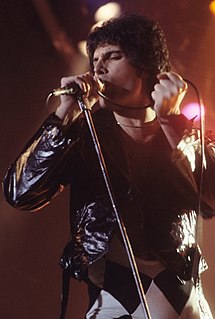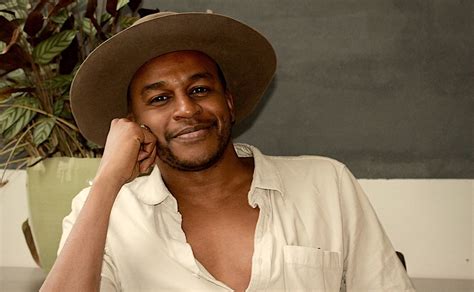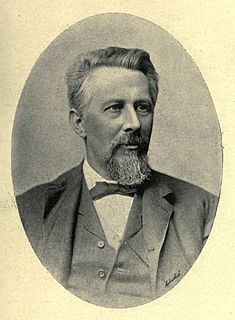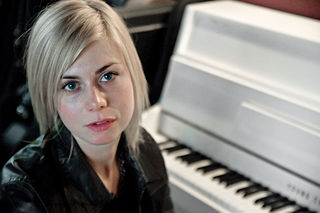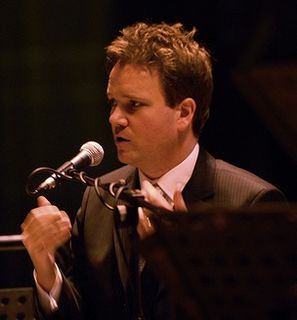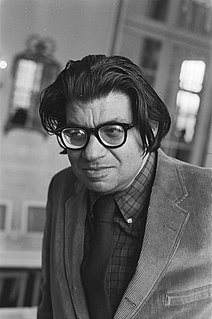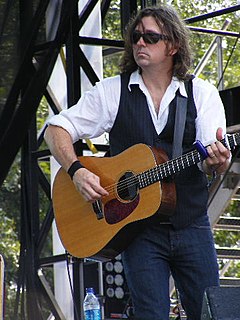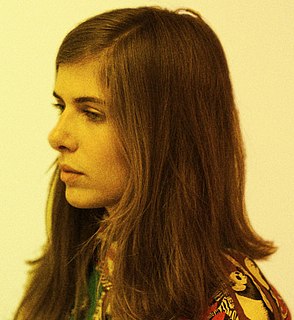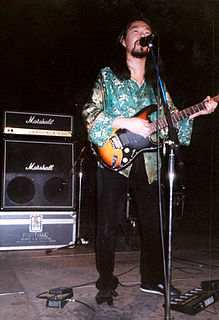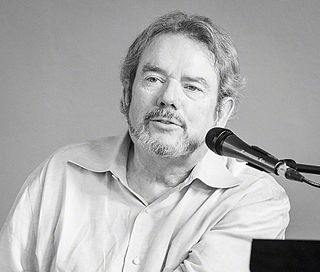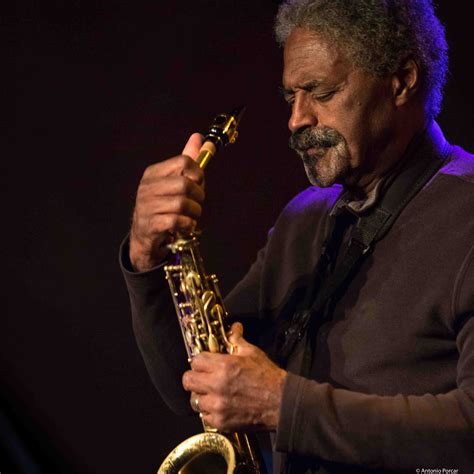Top 522 Melodies Quotes & Sayings - Page 9
Explore popular Melodies quotes.
Last updated on December 25, 2024.
A song that sounds simple is just not that easy to write. One of the objectives of this record was to try and write melodies that continue to resonate...Everything that happens to you influences your writing...The writing process for me is pretty much always the same-it's a solitary experience...I have yet to write that one song that defines my career...Beck said he didn't believe in the theory of a song coming through you as if you were an open vessel. I agree with him to a certain extent.
People are always asking me what my lyrics mean. Does it mean this, does it mean that, that's all anybody wants to know. F**k them, darling. I say what any decent poet would say if you dared ask him to analyze his work: If you see it, dear, then it's there. ... I think my melodies are superior to my lyrics. ... I was never too keen on the British music press. They've called us a supermarket hype, and they used to suggest that we didn't write our own songs.
I find it very difficult not to write in any sort of Sudanese style. With Sudanese music, there are very specific things that happen with the syncopation of the drums, melodies and stuff. And whenever I write, that's always the first thing that comes out, because I grew up listening to it. It's a part of me, so I try to bring that out in the music. I think that you have to be honest with what you do, and that's the most honest thing that I can do, is to write that way.
I thought that my voyage had come to its end at the last limit of my power, that the path before me was closed, that provisions were exhausted, and the time come to take shelter in a silent obscurity, but I find that thy will knows no end in me, and when old words die out on the tongue, new melodies break forth from the heart, and where the old tracks are lost, new country is revealed with its wonders.
For the poets tell us, don't they, that the melodies they bring us are gathered from rills that run with honey, out of glens and gardens of the Muses, and they bring them as bees do honey, flying like the bees? And what they say is true, for a poet is a light and winged thing, and holy, and never able to compose until he has become inspired, and is beside himself, and reason is no longer in him. So long as he has this in his possession, no man is able to make poetry or to chant in prophecy.
The closest Western Civilization has come to unity since the Congress of Vienna in 1815 was the week the Sgt. Pepper album was released.. . . . At the time I happened to be driving across country on Interstate 80. In each city where I stopped for gas or food — Laramie, Ogallala, Moline, South Bend — the melodies wafted in from some far-off transistor radio or portable hi-fi. It was the most amazing thing I’ve ever heard. For a brief while the irreparable fragmented consciousness of the West was unified, at least in the minds of the young.
If thou speakest not I will fill my heart with thy silence and endure it. I will keep still and wait like the night with starry vigil and its head bent low with patience. The morning will surely come, the darkness will vanish, and thy voice pour down in golden streams breaking through the sky. Then thy words will take wing in songs from every one of my birds' nests, and thy melodies will break forth in flowers in all my forest groves.
When we listen to improvisational jazz, or solo classical violinists, the way they phrase and inflect melodies feels vocal, like they’re talking to us. When I was figuring out how to perform solo, I wanted to move back and forth between bass riffs, melody, and harmony, so I often used sounds instead of — or alongside — the words of a song. I found that if I sang a line using the consonants, vowels, shadings, and inflection we recognize as human language sounds, people responded as if I were talking to them.
It was a matter of not seeing the woods for the trees. Glorious songs have been in Ireland forever, but a lot of these were so popular they were sung only by drunken men at weddings. They didn't have any regard for the song at all. So, I picked out 14 songs that I had grown up with, songs with great melodies. After 35 years as a songwriter, I appreciate the value of a good melody because I know how hard it is to write one. So I presented them in a new way, with piano, keyboards, strings, and a contemporary rhythm section. I just treated the melody with a bit of dignity and a bit of style.
That's that Dungeon Family ethos: being able to reinvent yourself, stand out and stand alone. Having your own character and having your own image, no matter what they say about you. I want to show my versatility and how diverse I am, how I approach the track, my rhythm, my melodies. It's something different.
There are not more than five musical notes, yet the combinations of these five give rise to more melodies than can ever be heard.There are not more than five primary colors, yet in combination they produce more hues than can ever been seen.There are not more than five cardinal tastes, yet combinations of them yield more flavors than can ever be tasted.
Many people think of me as just a riff guitarist, but I think of myself in broader terms. As a musician I think my greatest achievement has been to create unexpected melodies and harmonies within a rock and roll framework. And as a producer I would like to be remembered as someone who was able to sustain a band of unquestionable individual talent, and push it to the forefront during its working career. I think I really captured the best of our output, growth, change and maturity on tape - the multifaceted gem that is Led Zeppelin.
Heard melodies are sweet, but those unheard Are sweeter: therefore, ye soft pipes, play on; Not to the sensual ear, but, more endear'd, Pipe to the spirit ditties of no tone. Fair youth, beneath the trees, thou canst not leave Thy song, nor ever can those trees be bare; Bold Lover, never, never canst thou kiss, Though winning near the goal yet, do not grieve; She cannot fade, though thou hast not thy bliss, For ever wilt thou love, and she be fair!
Wardruna is a combination of old and new. I use historical instruments and new and electronic instruments and tools. I use drones and samples to build these huge sounds. Sometimes just a sound can trigger words or melodies. I don't have a romantic notion about the past; with Wardruna I wanted to create something new using something old.
Spring scarce had greener fields to show than these Of mid September; through the still warm noon The rivulets ripple forth a gladder tune Than ever in the summer; from the trees Dusk-green, and murmuring inward melodies, No leaf drops yet; only our evenings swoon In pallid skies more suddenly, and the moon Finds motionless white mists out on the leas.
I work in bits and pieces. When I'm touring it's difficult. After touring, when I have space and time, it's a process, something I've been doing since I was 10 or 11 years old. I collect lyrics, melodies, bits and pieces, and finally it all comes together. It's hard to say - I've been trying to figure out how the process works.
I've just really been into melody and lyrics and songwriting. Writing a rap, to me, is easy. I could write a rap like that. But writing songs and melodies and s**t that's hopefully going to stick around for 30, 40 years is f**king hard...If you have good songs and you're talented, people will eventually come to your shows, people will buy your music.
Every time I finish a song... most of the time it's in my own head, like this sounds too much like a Townes Van Zandt song, or whoever. I realize there are so many melodies and chord progressions in pop and rock music that are so similar that you can kind of trace it back to other things. Most of the time it's just in your head.
My background is Protestant so I benefited from the great Bible teaching that was provided there... I did love the more culturally classical things, like Irish music, which I think is some of the most congregational-style music when you think of... 'St. Patrick's Breastplate' (and) 'Danny Boy.' These are traditional Irish melodies. I think being brought up there (Ireland) gave me a sense of melody that is very attuned to congregational singing.
Paul Simon once said that a songwriter's supreme challenge was being complex and simple at the same time-writing songs with lasting depth that are also simple enough to be memorable. Jimmy Van Heusen was a master at this kind of song. His music was complex, with deeply rich chord changes any jazzman can embrace, but also possessed catchy, crystalline melodies of exceeding sing-ability. His songs were meant to be sung, not just listened to, and they were sung by the best, with Frank Sinatra and Bing Crosby at the top of that list.
It appears to me that the subject of music, from Machaut to Boulez, has always been its construction. Melodies of 12-tone rows just don't happen. They must be constructed....To demonstrate any formal idea in music, whether structure or stricture, is a matter of construction, in which the methodology is the controlling metaphor of the composition...Only by 'unfixing' the elements traditionally used to construct a piece of music could the sounds exist in themselves--not as symbols, or memories which were memories of other music to begin with.
I try to keep my eyes and ears open all the time for the bones of my next song: things people say, melodies I hear in my head, and little musical parts I may stumble across. I write them down or record them on my phone. Whatever I need to do to keep the idea for later when I have the time to sit down with it. So writing for me is a 24/7 pursuit.
I have a lot of my mother in me, but I was just born with the same parts as my father. I don't sound like him. I mean, I can do an impression of him right now, and I do not sound like him. I sound like me. My sense of rhythm I learned from my mother. My melodies, I think sometimes, I get from my mother.
Electronic music was just discovery about sound, all our sound options. The core percussions and melodies, they forget about it, they didn't think about those those for a good four, five years, because they were just discovering the new tools and what they could do with them, you know? The big folk revival, I think is a backlash against that. And now, I think they'll probably try to find somewhere in the middle. It's interesting. It's like push-and-pull. It's always like that, you know? Music history is always like that, this repeating evolution of music.
Your music can be played easily and well by any half-stringed harper or fumble-fingered idiot. Not that I'm maligning your songs. It's just that they're an entirely different kettle of fish-to use a seamanly metaphor-to Domick's. Don't you judge your songs against his standard! More people have already listened to your melodies and liked them than will ever hear Domick's, much less like them.
My plea therefore is this: Let us get our instruments tightly strung and our melodies sweetly sung. Let us not die with our music still in us. Let us rather use this precious mortal probation to move confidently and gloriously upward toward the eternal life which God our Father gives to those who keep his commandments.
One of the best records I’ve ever heard. Seriously, maybe top 20 all-time… I think if Rich Mullins had been given more time here, and if God had blessed his life with love and a wife, if he had the chance to see as much of the relational beauty as he saw of the natural beauty, I think he might have written some songs like the ones we find on BiRDS OF RELOCATiON. And you know that’s about the highest praise I can give someone. You will not find a combination of more beautiful poetry, raw honesty, and gorgeous melodies for a long time.
Vocals are not central to what I do, and I've never liked singing live. I've always been more inspired by rhythm, texture, harmony than vocal melodies and lyrics. Plus, for me, I can better express my musical ideas through instrumental music than vocal music, the emotional interpretation of which can easily supersede the actual musical content or aim.
Many love music but for music's sake, Many because her touches can awake Thoughts that repose within the breast half-dead, And rise to follow where she loves to lead. What various feelings come from days gone by! What tears from far-off sources dim the eye! Few, when light fingers with sweet voices play, And melodies swell, pause, and melt away, Mind how at every touch, at every tone, A spark of life hath glistened and hath gone.
I feel connected to every song on this record [ 'Modern Vampires Of The City' ], but yeah I think there's something special about 'Young Lion'. It's pretty different from any song that we've had before because the vocals are kind of between two different very simple instrumental piano melodies and it's almost like something that we call a vignette, it's sort of like a miniature.
I want to sing using a throatsinging style, like for example kargyraa, but at the same time sing it like a normal way. Maybe I will try some opera. To sing a melody, and to sing not only Tuvan traditional melodies, but I would like to try Western classics, blues. I think Tuvan music and American blues are very close to each other.
Well, the first thing I do is I try to listen to whatever rapping is already on the track. I listen for cadence and melody to see how the track's already been written, and to make sure that whatever flow or flows I decide to run with, or patterns or melodies that I decide to put into the song, that they're not already in there. Then I try to see if there's a different part of the subject matter that I can talk about.
Then the voices of the Ainur, like unto harps and lutes, and pipes and trumpets, and viols and organs, and like unto countless choirs singing with words, began to fashipn the theme of Iluvatar to a great music; and a sound arose of endless interchanging melodies woven in harmony that passed beyond hearing into the depths and into the heights, and the places of the dwelling of Iluvatar were filled to overflowing, and the music and the echo of the music went out into the Void, and it was not void.
For people could close their eyes to greatness, to horrors, to beauty, and their ears to melodies or deceiving words. But they couldn't escape scent. For scent was a brother of breath. Together with breath it entered human beings, who couldn't defend themselves against it, not if they wanted to live. And scent entered into their very core, went directly to their hearts, and decided for good and all between affection and contempt, disgust and lust, love and hate. He who ruled scent ruled the hearts of men.
I basically love classical music. I love a lot of musicians playing together and the whole culture of that whether it's Indian or it's Western. But in India, I think it's limited to filler music unfortunately. That's one thing I want to push in India where we have the infrastructure of an orchestra where you play Indian melodies with an orchestra and something different for a universal audience. It requires a lot of work from me.
Even if chords are simple, they should rub. They should have dissonances in them. I've always used a lot of alternate bass lines, suspensions, widely spaced voicings. Dfferent textures to get very warm chords. Sometimes you're setting up strange chords by placing a chord in front of it that's going to set it off like a diamond in a gold band. It's not just finding interesting chords, it's how you sequence them, like stringing together pearls on a string. ... Interesting chords will compel interesting melodies. It's very hard to write a boring melody to an interesting chord sequence.
Melodies can be good depending on the context. You can have a simple melody, and if the harmony behind it is interesting, it can make a very simple melody really different. You can also have a complex melody. The more complex it is, the harder it is to sing, and then sometimes it can sound contrived. You could write a melody that would be fine on a saxophone but if you give it to a singer, it can sound raunchy.
I met the pianist Barry Harris when I was about fifteen. He would show me changes, which I had no idea existed. I knew about scales, but I didn't think about chords. I was fortunate in that he lived right around the corner so I'd be at his house almost every day and he showed me about playing melodies over chords. After about three years, I could play some gigs. I worked with drummer Roy Brooks and other guys my age at that time, like trumpeter Lonnie Hillyer. Some of the older guys were Paul Chambers, Doug Watkins and Louis Hayes

